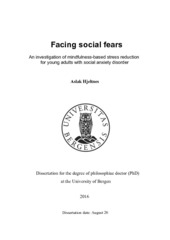| dc.contributor.author | Hjeltnes, Aslak | |
| dc.date.accessioned | 2016-09-13T12:18:43Z | |
| dc.date.available | 2016-09-13T12:18:43Z | |
| dc.date.issued | 2016-08-26 | |
| dc.identifier.isbn | 978-82-308-3270-7 | |
| dc.identifier.uri | https://hdl.handle.net/1956/12785 | |
| dc.description.abstract | Social anxiety disorder (SAD) is a prevalent condition that often leads to co-morbid mental disorders and chronic functional impairments in most domains of human life. Psychological interventions are often effective, but many SAD patients do not respond to existing treatments, highlighting a need to explore new psychological interventions in order to expand the range of effective treatments for SAD. Mindfulness and acceptance-based interventions (MABIs) have been proposed as a promising strategy for SAD, although existing studies have yielded mixed findings. The purpose of this dissertation was to explore the experiences and psychological changes of 54 young adults who participated in an open trial of mindfulness-based stress reduction (MBSR) for SAD. How do young adults who struggle with problems in the social anxiety spectrum experience and relate to their difficulties before, during and after they participate in an eight-week MBSR program? The dissertation consists of three papers. The aim of paper 1 was to explore the lived experiences of the young adults before they began the MBSR program. The aim of paper 2 was to examine mindfulness-based stress reduction for young adults with SAD. The aim of paper 3 was to investigate how the participants with the most and least change in their symptoms experienced the process of undergoing the MBSR program. The clinical study was based on a quasi-experimental mixed methods design. The first paper was a qualitative study using in-depth interviews (n = 29) to explore the lived experiences of participants prior to the program. The second paper was a quantitative study that investigated the MBSR program as an intervention for young adults (n = 53) with SAD. The third paper was a mixed methods study exploring how the participants (n = 14) with the most and least symptomatic change experienced the process of participating in the MBSR program. The qualitative interviews were analyzed using a thematic analysis methodology, based on a hermeneuticphenomenological epistemology. Statistical analyses were conducted to assess prepost changes in social anxiety symptoms, global psychological distress, mindfulness, self-compassion and self-esteem after the MBSR program. In paper 1, we identified five themes describing why the young adults sought help for social anxiety. The themes were: (a) from being shy to interpreting anxiety as a mental health problem, (b) experiencing emotions as threatening and uncontrollable, (c) encountering loneliness as relationships fall away, (d) hiding the vulnerable self from others, and (e) deciding to face social fears in the future. In paper 2, we found that the participants who completed the MBSR program reported significant reductions in-, and large effect sizes for, social anxiety symptoms and global psychological distress, as well as significant improvements in mindfulness, selfcompassion and self-esteem. The largest effect sizes were found for self-compassion and mindfulness. Two thirds of the participants (69%) who were in the clinical range at pretreatment reported either clinically significant change (37%) or reliable improvement (31%) on SAD symptoms after completing the MBSR program, while almost two thirds (63%) reported clinically significant change (37%) or reliable improvement (26%) on global psychological distress. Approximately a third of the participants continued to describe symptoms in the clinical range after completing the MBSR program. In paper 3, we explored how the participants with high and low symptomatic change experienced the MBSR program. We identified the global theme of (1) discovering agency to change or not feeling empowered through the MBSR program, and four subthemes: (2) forming an active commitment or feeling ambivalence towards learning mindfulness, (3) engagement with others or avoidance of contact with the group, (4) using the mindfulness exercises to approach or resigning when facing unpleasant experiences, and (5) using the course to break interpersonal patterns or remaining stuck in everyday life. The findings in this dissertation indicate that the MBSR program may be a beneficial intervention for young adults with social anxiety disorder, although the MBSR program may not work for all participants. The different experiences of the improved and less-improved participants in this study suggest that it may be important to match clients to their preferred psychological treatment. The methodological limitations of this study highlight the need for more research on MABIs for social anxiety disorder, and who are most likely to benefit or not benefit from the MBSR program. | en_US |
| dc.language.iso | eng | eng |
| dc.publisher | The University of Bergen | eng |
| dc.relation.haspart | Paper 1: Hjeltnes, A.; Moltu, C.; Schanche, E. & Binder, P. E. (2016). What brings you here? Exploring why young adults seek help for social anxiety. Qualitative Health Research, 26(12), 1705-1720. The article is not available in BORA due to publisher restrictions. The published version is available at: <a href="http://dx.doi.org/10.1177/1049732315596151" target="blank">http://dx.doi.org/10.1177/1049732315596151</a> | eng |
| dc.relation.haspart | Paper 2: Hjeltnes, A., Molde, H.; Schanche, E.; Vøllestad, J.; Svendsen, J.; Moltu, C. & Binder, P. E. An open trial of mindfulnessbased stress reduction for young adults with social anxiety disorder. The article is not available in BORA. | eng |
| dc.relation.haspart | Paper 3: Hjeltnes, A.; Moltu; C.; Schanche; E.; Jansen, Y. & Binder, P. E. (2018). Both sides of the story: Exploring how improved and less-improved participants experience mindfulness-based stress reduction for social anxiety disorder. Psychotherapy Research, 28(1), 106-122. The article is not available in BORA due to publisher restrictions. The published version is available at: <a href="http://dx.doi.org/10.1080/10503307.2016.1169330" target="blank">http://dx.doi.org/10.1080/10503307.2016.1169330</a> | eng |
| dc.title | Facing social fears. An investigation of mindfulness-based stress reduction for young adults with social anxiety disorder | eng |
| dc.type | Doctoral thesis | |
| dc.rights.holder | Copyright the author. All rights reserved | eng |
| dc.identifier.cristin | 1376306 | |

